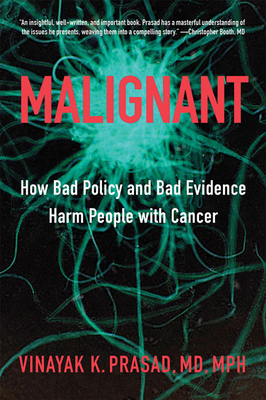Malignant: How Bad Policy and Bad Evidence Harm People with Cancer

Malignant: How Bad Policy and Bad Evidence Harm People with Cancer
Each week, people read about new and exciting cancer drugs. Some of these drugs are truly transformative, offering major improvements in how long patients live or how they feel--but what is often missing from the popular narrative is that, far too often, these new drugs have marginal or minimal benefits. Some are even harmful. In Malignant, hematologist-oncologist Dr. Vinayak K. Prasad writes about the many sobering examples of how patients are too often failed by cancer policy and by how oncology is practiced. Throughout this work, Prasad illuminates deceptive practices which
- promote novel cancer therapies long before credible data are available to support such treatment; and
- exaggerate the potential benefits of new therapies, many of which cost thousands and in some cases hundreds of thousands of dollars.
Prasad then critiques the financial conflicts of interest that pervade the oncology field, the pharmaceutical industry, and the US Food and Drug administration.
This is a book about how the actions of human beings--our policies, our standards of evidence, and our drug regulation--incentivize the pursuit of marginal or unproven therapies at lofty and unsustainable prices. Prasad takes us through how cancer trials are conducted, how drugs come to market, and how pricing decisions are made, asking how we can ensure that more cancer drugs deliver both greater benefit and a lower price. Ultimately, Prasad says,
- more cancer clinical trials should measure outcomes that actually matter to people with cancer;
- patients on those trials should look more like actual global citizens;
- we need drug regulators to raise, not perpetually lower, the bar for approval; and
- we need unbiased patient advocates and experts.
This well-written, opinionated, and engaging book explains what we can do differently to make serious and sustained progress against cancer--and how we can avoid repeating the policy and practice mistakes of the past.
PRP: 261.00 Lei
Acesta este Prețul Recomandat de Producător. Prețul de vânzare al produsului este afișat mai jos.
208.80Lei
208.80Lei
261.00 LeiLivrare in 2-4 saptamani
Descrierea produsului
Each week, people read about new and exciting cancer drugs. Some of these drugs are truly transformative, offering major improvements in how long patients live or how they feel--but what is often missing from the popular narrative is that, far too often, these new drugs have marginal or minimal benefits. Some are even harmful. In Malignant, hematologist-oncologist Dr. Vinayak K. Prasad writes about the many sobering examples of how patients are too often failed by cancer policy and by how oncology is practiced. Throughout this work, Prasad illuminates deceptive practices which
- promote novel cancer therapies long before credible data are available to support such treatment; and
- exaggerate the potential benefits of new therapies, many of which cost thousands and in some cases hundreds of thousands of dollars.
Prasad then critiques the financial conflicts of interest that pervade the oncology field, the pharmaceutical industry, and the US Food and Drug administration.
This is a book about how the actions of human beings--our policies, our standards of evidence, and our drug regulation--incentivize the pursuit of marginal or unproven therapies at lofty and unsustainable prices. Prasad takes us through how cancer trials are conducted, how drugs come to market, and how pricing decisions are made, asking how we can ensure that more cancer drugs deliver both greater benefit and a lower price. Ultimately, Prasad says,
- more cancer clinical trials should measure outcomes that actually matter to people with cancer;
- patients on those trials should look more like actual global citizens;
- we need drug regulators to raise, not perpetually lower, the bar for approval; and
- we need unbiased patient advocates and experts.
This well-written, opinionated, and engaging book explains what we can do differently to make serious and sustained progress against cancer--and how we can avoid repeating the policy and practice mistakes of the past.
Detaliile produsului










